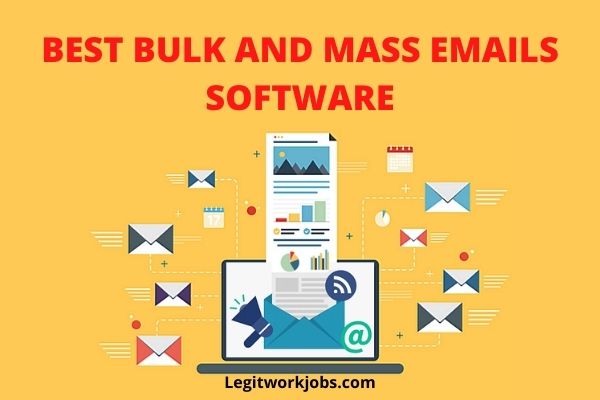Business Software
15 Best Email Marketing Software or Tools in 2023 [Free & Paid]
Email marketing is one of the most effective ways to reach and engage with customers. It allows businesses to communicate with their audience in a personalized and targeted manner, leading to increased brand awareness, customer loyalty, and sales. However, managing an email marketing campaign can be time-consuming and complex, which is why many businesses turn to email marketing software to simplify the process.
15 Best Email Marketing Software or Tools in 2023
In this article, we will review some of the best email marketing software available on the market.
1. Moosend:
Moosend is a cloud-based email marketing software that offers a range of features, including automation workflows, email personalization, and list management. In this review, we will take a closer look at the pros and cons of using Moosend for your email marketing needs.
Pros:
- Affordable pricing: Moosend is an affordable option for businesses of all sizes, with plans starting at just $8 per month for up to 1,000 subscribers.
- User-friendly interface: Moosend’s drag-and-drop email editor is intuitive and easy to use, making it simple to create professional-looking emails even if you have limited design experience.
- Automation workflows: Moosend offers a variety of automation workflows, including welcome series, abandoned cart reminders, and more. These workflows can help save time and improve engagement with your subscribers.
- Integration options: Moosend integrates with a variety of popular platforms, including WordPress, Shopify, and Salesforce, making it easy to connect with your existing tools and streamline your email marketing efforts.
- Customer support: Moosend offers excellent customer support, including a knowledge base, video tutorials, and live chat support.
Cons:
- Limited customization options: While Moosend’s email editor is user-friendly, it may be limiting for businesses that require more advanced customization options for landing pages and forms.
- Reporting and analytics: Some users may find Moosend’s reporting and analytics features to be less robust than those offered by other email marketing tools.
- Limited landing page functionality: Moosend’s landing page editor is basic and may not offer enough functionality for businesses with more complex landing page needs.
Overall, Moosend is a solid option for businesses on a budget looking for basic email marketing functionality. While it may not offer as many advanced features as some of its competitors, its affordability and ease of use make it a strong contender for businesses just starting with email marketing.
2. Constant Contact:
Constant Contact is an email marketing software designed for small businesses. It offers a range of features, including email templates, list management, social media integration, and more. In this review, we will take a closer look at the pros and cons of using Constant Contact for your email marketing needs.
Pros:
- User-friendly interface: Constant Contact’s interface is easy to use, even for beginners, with a drag-and-drop editor for creating email templates.
- Robust email automation: Constant Contact offers powerful email automation tools, including welcome series, abandoned cart reminders, and more.
- Contact management: Constant Contact’s contact management features are comprehensive, allowing you to segment your list based on subscriber behavior, location, and more.
- Customer support: Constant Contact offers phone, email, and chat support to its customers, along with a large knowledge base and community forum.
- Integrations: Constant Contact integrates with a variety of third-party platforms, including Shopify, WordPress, and Salesforce, making it easy to connect with your existing tools.
Cons:
- Limited design customization: While Constant Contact’s email templates are easy to use, they may be limiting for businesses that require more advanced customization options.
- Pricing: Constant Contact’s pricing is higher than some of its competitors, with plans starting at $20 per month for up to 500 subscribers.
- Limited reporting and analytics: Some users may find Constant Contact’s reporting and analytics features to be less robust than those offered by other email marketing tools.
- Limited landing page functionality: Constant Contact’s landing page editor is basic and may not offer enough functionality for businesses with more complex landing page needs.
Overall, Constant Contact is a solid choice for small businesses looking for an easy-to-use email marketing tool with powerful automation features. While its pricing may be higher than some of its competitors, its comprehensive contact management and integrations make it a strong contender for businesses looking to streamline their email marketing efforts.
3. Sendinblue:
Sendinblue is an all-in-one email marketing and automation software designed for small to medium-sized businesses. In this review, we will take a closer look at the pros and cons of using Sendinblue for your email marketing needs.
Pros:
- Affordable pricing: Sendinblue offers competitive pricing, with plans starting at just $25 per month for up to 10,000 emails.
- Email automation: Sendinblue’s automation features are robust, allowing you to create complex workflows and trigger emails based on user behavior.
- Contact management: Sendinblue’s contact management features are comprehensive, allowing you to segment your list based on subscriber behavior, location, and more.
- SMS marketing: Sendinblue also offers SMS marketing capabilities, making it a great all-in-one solution for businesses looking to reach customers through multiple channels.
- Integrations: Sendinblue integrates with a variety of third-party platforms, including Shopify, WordPress, and Salesforce, making it easy to connect with your existing tools.
Cons:
- Limited design customization: While Sendinblue offers a range of email templates, some users may find the design customization options to be limited.
- Limited reporting and analytics: Some users may find Sendinblue’s reporting and analytics features to be less robust than those offered by other email marketing tools.
- Support: While Sendinblue offers phone and email support, some users may find the support to be less responsive than they would like.
- Learning curve: Some users may find Sendinblue’s interface to be more complex than other email marketing tools, requiring a bit of a learning curve to get started.
Overall, Sendinblue is a great option for small to medium-sized businesses looking for an all-in-one email marketing and automation solution at an affordable price. Its comprehensive contact management and SMS marketing capabilities, along with its range of integrations, make it a strong contender for businesses looking to streamline their marketing efforts. However, businesses looking for more advanced design customization options or robust reporting and analytics may want to consider other email marketing tools.
5. HubSpot:
HubSpot is an all-in-one marketing, sales, and customer service software platform designed for businesses of all sizes. In this review, we will take a closer look at the pros and cons of using HubSpot for your marketing needs.
Pros:
- All-in-one solution: HubSpot offers a wide range of tools and features, including email marketing, social media management, SEO, landing pages, and more, making it a great all-in-one solution for businesses looking to streamline their marketing efforts.
- User-friendly interface: HubSpot’s interface is easy to use and intuitive, making it easy for users to get started and create marketing campaigns quickly.
- Advanced reporting and analytics: HubSpot offers robust reporting and analytics features, allowing you to track the performance of your marketing campaigns and make data-driven decisions.
- Integrations: HubSpot integrates with a variety of third-party platforms, including Salesforce, WordPress, and Shopify, making it easy to connect with your existing tools.
- Support: HubSpot offers a wide range of support options, including phone, email, and live chat, as well as a comprehensive knowledge base.
Cons:
- Expensive pricing: HubSpot’s pricing can be a bit steep, with plans starting at $50 per month for the basic marketing hub.
- Learning curve: While HubSpot’s interface is user-friendly, some users may find the platform’s extensive features and capabilities to be overwhelming at first.
- Limited design customization: While HubSpot offers a range of templates, some users may find the design customization options to be limited.
- Contact management: While HubSpot’s contact management features are comprehensive, some users may find the platform’s approach to contact management to be more complex than they would like.
Overall, HubSpot is a great option for businesses looking for an all-in-one marketing solution with advanced reporting and analytics features. Its user-friendly interface, integrations, and comprehensive support make it a strong contender for businesses of all sizes. However, businesses looking for a more affordable option or more advanced design customization options may want to consider other marketing tools.
6. ConvertKit:
ConvertKit is an email marketing software that was founded in 2013. It is designed specifically for bloggers, podcasters, and other content creators. The software is known for its ease of use, automation capabilities, and visual automation builder. Here is a detailed review of ConvertKit and its pros and cons:
Pros:
- Easy to use: ConvertKit is known for its simple and intuitive interface that is easy to navigate even for beginners.
- Visual automation builder: The automation builder is visual and intuitive, making it easy to create complex automation workflows.
- Segmentation: ConvertKit allows you to segment your subscribers based on their interests and behaviors, allowing you to send more targeted emails.
- Email editor: The email editor is simple and easy to use, with drag and drop functionality and customizable templates.
- Integrations: ConvertKit integrates with many popular platforms like WordPress, Shopify, and Zapier.
Cons:
- Limited design options: While the email editor is easy to use, it has limited design options compared to other email marketing software.
- Limited email templates: ConvertKit has a limited selection of email templates compared to other email marketing software.
- Limited reporting: The reporting features are not as robust as other email marketing software, making it difficult to track performance and make data-driven decisions.
- Limited landing page functionality: The landing page editor is basic and lacks the advanced functionality of other landing page builders.
- No free plan: ConvertKit does not offer a free plan, making it less accessible for small businesses and startups.
Overall, ConvertKit is a great choice for bloggers, podcasters, and content creators who want an easy-to-use email marketing software with powerful automation capabilities. However, it may not be the best option for businesses with more complex email marketing needs or those on a tight budget.
7. AWeber:
AWeber is an email marketing software that was founded in 1998. It is one of the oldest email marketing platforms on the market and is known for its robust features, including automation, landing page creation, and email templates. Here is a detailed review of AWeber and its pros and cons:
Pros:
- User-friendly interface: AWeber’s interface is easy to use and navigate, even for beginners.
- Email automation: AWeber offers robust automation features that allow you to send targeted emails based on subscriber behavior.
- Landing page builder: AWeber’s landing page builder is easy to use and offers a variety of templates.
- Email templates: AWeber offers a large selection of customizable email templates to choose from.
- Integrations: AWeber integrates with many popular platforms like WordPress, Shopify, and Zapier.
Cons:
- Limited visual automation builder: AWeber’s automation builder is not as visual and intuitive as some of its competitors.
- Limited segmentation options: While AWeber does offer some segmentation capabilities, it is not as robust as some other email marketing platforms.
- Limited reporting: AWeber’s reporting features are not as comprehensive as some other email marketing software.
- Price: AWeber’s pricing can be more expensive than some of its competitors, especially for businesses with larger email lists.
- Limited third-party integrations: While AWeber does offer integrations with popular platforms, it may not have the same depth of integrations as some other email marketing software.
Overall, AWeber is a great choice for businesses that want a robust email marketing platform with automation and landing page creation capabilities. While its pricing can be more expensive than some of its competitors, its user-friendly interface and email templates make it a great option for businesses that are new to email marketing.
8. GetResponse:
GetResponse is an all-in-one marketing platform that provides solutions for email marketing, automation, landing pages, webinars, and more. It’s a popular choice for businesses of all sizes, offering a range of features to help marketers create effective campaigns and generate leads.
Pros:
- Offers a drag-and-drop email editor for easy customization
- Provides a range of automation workflows for targeted and personalized messaging
- Integrates with a variety of other tools and platforms
- Offers a free trial and affordable pricing plans
- Provides excellent customer support
Cons:
- The interface can be overwhelming for new users
- The landing page builder could be more user-friendly
- Some features are only available on higher-priced plans
Overall, GetResponse is a powerful and versatile platform that can help businesses achieve their marketing goals. Its automation features and integrations make it a great choice for businesses looking to streamline their marketing efforts and reach their target audience effectively.
9. Campaign Monitor:
Campaign Monitor offers a range of features such as email automation, personalized content, and analytics. It also offers a drag-and-drop email builder for easy customization.
10. Mailchimp:
Mailchimp is one of the most popular email marketing platforms, offering a range of features such as email templates, automation, and analytics. It also offers a free plan for businesses with up to 2,000 subscribers.
11. Drip:
Drip is a marketing automation platform that offers email marketing tools, including automation workflows, personalized content, and analytics. It also offers integrations with other marketing tools such as e-commerce platforms.
12. ActiveCampaign:
ActiveCampaign offers a range of marketing tools, including email marketing, marketing automation, and CRM. It also offers integrations with other marketing tools such as social media platforms and e-commerce platforms.
13. Benchmark Email:
Benchmark Email offers a range of email marketing tools, including customizable templates, automation workflows, and A/B testing. It also offers integrations with other marketing tools such as social media platforms and e-commerce platforms.
14. MailerLite:
MailerLite offers a range of email marketing tools, including customizable templates, automation workflows, and landing pages. It also offers a free plan for businesses with up to 1,000 subscribers.
15. Omnisend:
Omnisend offers a range of email marketing tools, including automation workflows, personalized content, and SMS marketing. It also offers integrations with other marketing tools such as social media platforms and e-commerce platforms.
16. Klaviyo:
Klaviyo is a marketing automation platform that offers email marketing tools, including automation workflows, personalized content, and analytics. It also offers integrations with other marketing tools such as social media platforms and e-commerce platforms.
17. ActiveTrail:
ActiveTrail offers a range of email marketing tools, including customizable templates, automation workflows, and A/B testing. It also offers integrations with other marketing tools such as social media platforms and e-commerce platforms.
What to Look for in a Good Email Marketing Tool?
Choosing the right email marketing tool can be crucial to the success of your email marketing campaigns. There are numerous options available in the market, each offering different features and capabilities. To help you make an informed decision, here are some key factors to consider when looking for a good email marketing tool:
- Ease of use: The email marketing tool should be easy to use, with an intuitive interface that makes it easy to create and send emails, set up automation workflows, and view analytics.
- Email templates: The tool should offer a range of customizable email templates that can be tailored to your brand and message. This can save you time and effort, especially if you don’t have a design team.
- Automation: A good email marketing tool should offer automation capabilities that allow you to create workflows for different scenarios, such as welcome emails, abandoned cart emails, and follow-up emails.
- Segmentation: The tool should allow you to segment your email list based on different criteria, such as demographics, purchase history, and behavior. This allows you to send targeted messages to specific groups, increasing the chances of engagement.
- Integration: The tool should offer integrations with other marketing tools, such as social media platforms and e-commerce platforms, allowing you to create a cohesive marketing strategy.
- Analytics: The tool should offer detailed analytics that allow you to track the performance of your email campaigns, such as open rates, click-through rates, and conversions. This data can help you optimize your campaigns for better results.
- Deliverability: The email marketing tool should have a good reputation for email deliverability, ensuring that your messages reach your subscribers’ inboxes and not their spam folders.
- Support: The tool should offer good customer support, with options such as live chat, phone support, and email support. This can help you resolve any issues quickly and efficiently.
By considering these factors, you can find an email marketing tool that meets your business needs and helps you achieve your marketing goals.
Bonus Tip: Improve Your Email Deliverability
Email deliverability is a critical factor in the success of your email marketing campaigns. Here are some tips to improve your email deliverability:
- Build a quality email list: Make sure your subscribers have opted-in to receive your emails and regularly remove inactive subscribers.
- Use a reliable email service provider: Choose an email service provider that has a good reputation for email deliverability.
- Use a recognizable “From” name and email address: Use a name and email address that your subscribers will recognize and trust.
- Keep your subject lines relevant and engaging: Your subject line should accurately reflect the content of your email and entice subscribers to open it.
- Avoid spam trigger words: Avoid using words and phrases that are commonly associated with spam emails.
- Personalize your emails: Use your subscribers’ names and other relevant information to make your emails more personalized and engaging.
- Test and optimize your emails: Test different subject lines, send times, and content to optimize your emails for better engagement and deliverability.
By following these tips, you can improve your email deliverability and increase the chances of your messages reaching your subscribers’ inboxes.
Email Marketing Software FAQs
There is no single email marketing software that is the best for everyone, as the choice largely depends on specific business needs and budget. However, some popular options include Mailchimp, Constant Contact, Campaign Monitor, Aweber, and Sendinblue. It’s important to research and compare features before choosing one.
While many email marketing software options offer free trials or limited free plans, most have pricing tiers based on subscriber count and feature availability. Some popular email marketing tools with free plans include Mailchimp, Sendinblue, and Benchmark. However, their free plans often come with limitations and restrictions.
Mailchimp offers several advantages over Gmail for email marketing purposes, including advanced automation capabilities, list segmentation and management tools, detailed analytics, and a range of customizable templates. Additionally, Mailchimp allows you to send bulk emails without risking suspension or termination of your email account due to spam complaints.
Technically, it is possible to send bulk emails from Gmail or Outlook, but it is not recommended as it can result in account suspension or termination due to spam complaints. It’s better to use an email marketing software specifically designed for this purpose.
The cost of email marketing varies depending on factors such as the size of your email list, the frequency of emails sent, and the email marketing software used. It can range from free to hundreds or thousands of dollars per month.
Email marketing can indirectly help with SEO by driving traffic to your website, increasing brand awareness and engagement, and encouraging backlinks and social shares. However, email marketing is not a direct ranking factor in search engine algorithms, and it should not be relied upon as the sole means of SEO.
There are several email marketing apps available for Shopify, including Klaviyo, Omnisend, and Privy. The best app for you will depend on your specific needs, such as your budget, the size of your email list, and the features you require. It’s important to research and compare options before choosing.
There are many email marketing plugins available for WordPress, including Mailchimp for WordPress, Constant Contact, and Sendinblue. The best platform for you will depend on your specific needs, such as your budget, the size of your email list, and the features you require. It’s important to research and compare options before choosing.

 Blog2 years ago
Blog2 years ago8 Best Bulk and Mass Emails Software for Email Blast

 Blog2 years ago
Blog2 years ago50 Highest Paying Affiliate Programs to Earn Crazy Commission in 2023

 Blog2 years ago
Blog2 years agoWhat is Guest Blogging? And Why it’s Important for Your Blog

 Online Job2 years ago
Online Job2 years ago30 Legitimate Work from Home Jobs with No Startup Fee in 2023

 Entertainment2 years ago
Entertainment2 years agoGet to Know Yeh Rishta Kya Kehlata Hai Star Shivangi Joshi’s Net Worth

 Tech2 years ago
Tech2 years agoHow to Play Roblox on School Chromebook When Blocked 2023

 Blog2 years ago
Blog2 years ago10 Best Places to Design and Sell T-Shirts Online and Make Money

 lifestyle2 years ago
lifestyle2 years agoHow to Sell Your Hair for Money: A Step-by-Step Guide











